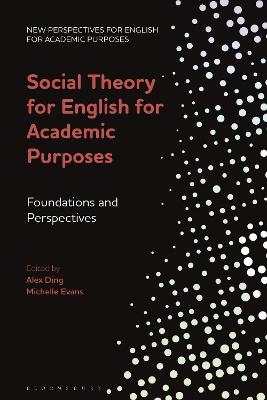
Social Theory for English for Academic Purposes
Bloomsbury Academic (Verlag)
978-1-350-22766-8 (ISBN)
The initial chapters outline what social theory is; the normative, critical, descriptive, social and generative purposes it serves; the scope and limits of social theory, and tracing the major historical traditions and recent currents. This mapping of social theory is followed by a detailed argument that makes the case for the centrality of social theory for EAP practitioners and praxis and the need to develop a sociological imagination to enhance knowledge and agency of practitioners. The contributions reveal the sociological foundations and commitments that underpin established theories in EAP, such as genre theories, systemic functional linguistics, and academic literacies. Each of these three major research streams in EAP is subject to critical analysis, linking each of these streams to the sociological commitments that underpin them. Finally, the book explores the social theories and approaches that have yet to make a full or significant impact on EAP research and practice, but would enable practitioners and researchers to understand educational contexts, texts, structures, culture(s), knowledge production and producers, and social agents with greater sociological clarity and sophistication. Topics covered include: social realism, legitimation code theory, critical realism, ethnography, feminism and Bourdieusian concepts for EAP.
The overarching aim of this volume is to position social theory much more centrally to frameworks and conceptions of the (unstable and contested) knowledge-base for EAP practitioners and to promote a ‘sociological imagination’ among and for EAP practitioners.
Alex Ding is Associate Professor of English for Academic Purposes and Director of Scholarship at the University of Leeds, UK. Michelle Evans is Lecturer of English for Academic Purposes at the University of Leeds, UK.
Part I: Foundations
1. Genre: Sociological Foundations and Implications, Michelle Evans, (University of Leeds, UK)
2. Academic Literacies: Theorising Language as Social Practice, Jackie Tuck (Open University, UK)
3. Systemic Functional Linguistics: a Social Theory of Language, Jim Martin (University of Sydney, Australia)
Part II: Perspectives
4. Legitimation Code Theory: Addressing fragmentation in EAP, Steve Kirk (University of Durham, UK)
5. Social Realism and Genre theory: Knowledge-building in EAP, Ian Bruce (University of Waikato, New Zealand)
6. Critical Realism: What can it do for EAP? , Julia Molinari (University of Nottingham, UK)
7. Bourdieu and Field Analysis: EAP and its Practitioners, Alex Ding (University of Leeds, UK)
8. Ethnography: Expanding the Boundaries in EAP, Haynes Collins (University of Leeds, UK) and Adrian Holliday (Canterbury Christ Church University, UK)
9. Feminism: Affordances and Applications for EAP, Yolanda Cerdá (University of Leeds, UK)
Afterword: Reflections on Omissions and Options, Michelle Evans (University of Leeds, UK)
References
Index
| Erscheinungsdatum | 11.08.2022 |
|---|---|
| Reihe/Serie | New Perspectives for English for Academic Purposes |
| Zusatzinfo | 10 bw illus |
| Verlagsort | London |
| Sprache | englisch |
| Maße | 156 x 234 mm |
| Themenwelt | Schulbuch / Wörterbuch ► Wörterbuch / Fremdsprachen |
| Geisteswissenschaften ► Sprach- / Literaturwissenschaft ► Sprachwissenschaft | |
| ISBN-10 | 1-350-22766-8 / 1350227668 |
| ISBN-13 | 978-1-350-22766-8 / 9781350227668 |
| Zustand | Neuware |
| Informationen gemäß Produktsicherheitsverordnung (GPSR) | |
| Haben Sie eine Frage zum Produkt? |
aus dem Bereich


